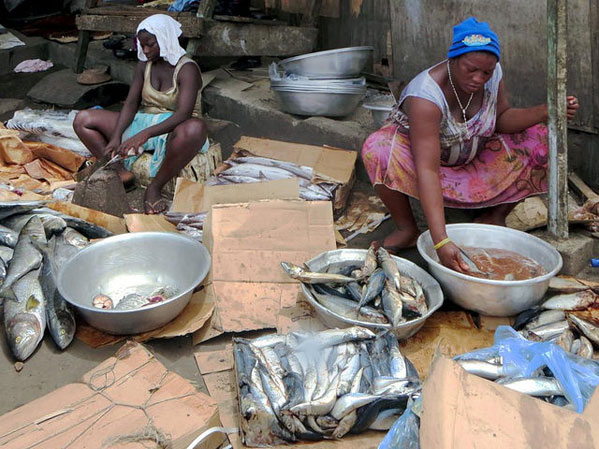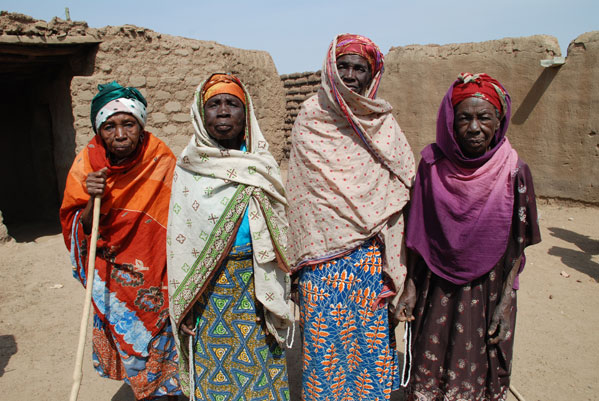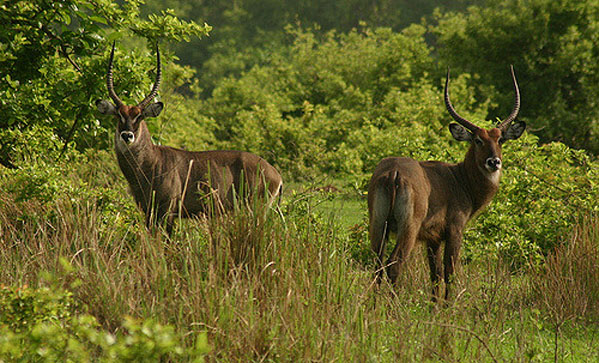Responsible tourism in Ghana
Travel right in Ghana
And Ghana requires this kind of understanding, the laissez-faire attitude. It is a wonderful vacation destination, with some of the best opportunities on the continent for genuine cultural interaction, but traveling here is not easy. It involves spending hours on bumpy roads, more simple accommodation than you may be accustomed to, and coming face to face with poverty. You might be able to escape it in the luxurious game lodges of other African destinations – but not here.
The vacation reviews on our website for Ghana are particularly moving; every traveler seems to have come back touched by the warmth of the people, the richness of the culture, the infectious song and dance, the stark beauty of the landscape. But they all come with warnings, too. “If you are expecting a 5 star hotel… wanting to sip cocktails by the pool, then this is definitely not the vacation for you.” They explain. “There is not much sightseeing type of tourist attractions… and not as many animals.” But these are not complaints; the reviewers reveal that this is Ghana’s appeal: “instead of being introduced to only tourist-y places, anyone who likes to stay off the beaten path and experience the 'real' Africa… it's the perfect destination.”
The key to responsible tourism in Ghana is doing your research, knowing what to expect, and keeping a wide open mind. And the rewards for doing so are fabulous.

People & Culture
Responsible volunteering & cultural differences
Think before volunteering
One of the worst examples is orphanage volunteering. Paying volunteers create a market for orphanages – and for sorrowful-looking children; this can mean that parents are persuaded to give up their children in the hope that they will have a better life in an institution. “Orphanages” can exist that are nothing of the sort, but they make good money from volunteers. Even in the genuine orphanages, sending unskilled volunteers to work with very vulnerable children, often for just a matter of days, is a terrible idea. The children, who have already lost their families, become attached to volunteers who shower them with gifts and hugs and attention – only to disappear the following week. In the worst case scenario, a lack of suitable background checks leaves these institutions – and children – open to the worst kinds of abuse. Read more on why we do not support orphanage volunteering in our orphanage campaign.
But there are plenty of other well meaning projects that may not be what they seem. Building classrooms is a classic example. Few volunteers have construction experience, and those that do may well be taking jobs away from local builders. This type of volunteering – where you have an impressive finished “product” – is also incredibly tokenistic; the classroom has been built, but are there any teachers to teach in it?
What you can do
It may all look like bad news, but don’t be put off volunteering in Ghana; just be sure to research well. Skilled volunteers are always useful, and there are programmes for teachers and student nurses. If you want to volunteer in a school but aren’t qualified, you can offer to help as a teaching assistant – helping children practise their English, do their sums, and meet someone from another country – quite a big deal in itself.
If you want to help in construction, there are still worthwhile projects. The composting toilet that our writer failed to build is actually a great example of a volunteer project. Thanks to income from lodge guests and volunteers, two workers are employed full time and others are brought in if funds allow. The composting toilets are great for the family’s health, their dignity and the environment – in a community where defecation would ordinarily be done outdoors – in the fields, or on the beach. This is also particularly unsafe and unpleasant for women and girls. If you are able to commit to volunteering for a week or more, you’ll learn the ropes when it comes to making cement bricks, and be genuinely useful to the project.
Even if you only have a couple of days (or rather, nights) to spare, you can still help out with sea turtle conservation along the coast. During the nesting season, local rangers patrol the beaches to prevent people from the surrounding villages from killing the turtles for meat, or taking their eggs. Every turtle and nest saved is hugely valuable.
Respecting cultural beliefs
Similarly, women across the north can be accused of witchcraft, and threatened with death. This can be done as revenge by family members; in other cases the “witches” are often found to have mental illnesses. The women accused of witchcraft are forced to flee to escape being killed, and many end up in “witch camps”, where they look after themselves, distancing themselves from the rest of society.
What you can do
It is possible to visit some of the witch camps; speak to your vacation company to find out if this can be included in your tour. Tourism provides a small amount of income to the women, and a valuable opportunity to speak to “outsiders” and not be judged.
*Source: AfriKids
**Source: Al Jazeera

WILDLIFE & ENVIRONMENT
Waste & wilderness
Preserving wild spaces
The landscape of Mole National Park is incredibly different to Kakum, but here, too, are elephants – around 800 of them. There are also buffalo, warthogs, hippos, several monkey and antelope species, and even big cats – though sightings of these are incredibly rate. Mole has been a national park since 1971 and is the largest in Ghana, but there are many concerns surrounding poaching within Mole, and the lack of funding to prevent this. There are lodges and wildlife guides, but Mole has never been a major tourist destination in the same way as many of Africa’s other national parks. An increase in responsible tourism in and around the park could be the key to resolving many of Mole’s issues.
What you can do
Visit the national parks! Visitors to Kakum will likely not see much of its larger fauna, but simply being in the rainforest is a wonderful experience in itself. There are only two canopy walks in Africa, and one of these is in Kakum – taking you 30m high through the trees, where you will observe birds, butterflies and hear monkeys. Mole too is a unique experience as guided bush walks bring you up close to elephants, and your fee will go towards protecting them. Money spent in surrounding communities also deters poachers (the majority live within 50km of the park’s boundaries) – and the majority of the park’s staff are also from local communities. More unusually, local beekeepers have begun selling fair trade honey, produced by bees in Mole National Forest – buying this supports local jobs, communities and the preservation of the forest.
*Source: UNESCO

The waste issue
What you can do
If possible, bring a water bottle or two, and buy large bottles to refill them from. Otherwise, sachets create less waste than plastic bottles (although you may not think it, given that they are strewn everywhere).
Responsible tourism tips
Travel better in Ghana
- Don’t hand out gifts – sweets, pens, notebooks – to children.This encourages begging, and creates the scenario of wealthy foreigners always providing handouts. If you wish to donate, ask your tour leader about the best way to do this. It may be to give items the village elder or chief, or to a head teacher – who can then distribute them later on. Your tour leader can also suggest which items are the most necessary. There seems to be an abundance of pens left behind by well-meaning travelers, and sweets are almost always a no-no.
- If possible, buy these items in Ghana to support local traders.
- Ghanaians are welcoming, chatty and often beautifully dressed in colourful fabrics, but resist the temptation to whip your camera out at every opportunity. The chances are that if you ask, people will be happy to pose for photos, and may even spot your camera and ask you to “snap” them. In markets, strike up conversations with stallholders and buy something before asking for a photo. Never photograph children without the parents’ permission – it’s certainly not something you’d do at home. Read our article for more tips on the ethics of travel photography.
- Always dress respectfully. The more rural and traditional the area, the more covered up people are. It is very hot in Ghana, but long, loose clothing is recommended – cover shoulders with sleeves or pashminas, and wear trousers or long skirts rather than shorts if possible. In the city, skimpier clothes are more acceptable.
- Be aware of your water and electricity use. Keep showers short, reuse towels and unplug any devices once charged. Don’t leave lights on when you are not in the room – and give the fan a go rather than the air conditioning.
- Do tip – but not too generously. Food and services are incredibly cheap in Ghana, but excessive tipping can result in situations where waiters earn more than teachers, which can cause problems. If in doubt, ask your tour leader what is a reasonable amount.
Ghana, Togo and Benin vacation, gold and magic
Traditional villages and voodoo in Ghana, Togo and Benin
Transatlantic slave trade tour, Ghana
Historical and cultural tour of Ghana
Ghana culture, nature and beach vacation
Explore Ghana’s stunning eco-beaches and unspoiled hotspots
Ghana vacation, coastal tour
Explore the exciting beaches and nature along coastal Ghana.
Ghana highlights and festival vacation
Celebrate Ghanaian culture & music at Afrofuture Festival
Cultural history vacation in Ghana
Authentic Ghana Eco, Culture, History and Wildlife Tours
A week in Ghana vacation
The perfect introduction to Ghana, run by locals
Ghana vacation, Kingdoms of Gold
Join our small group tour as we explore Ghana
Ghana ancestral tour
Visit ancient traditional communities and a naming ceremony
Ghana,Togo and Benin experience tour
Experience the culture, history and wildlife of West Africa
Voodoo Festival tour in Benin, Togo and Ghana
Experience the annual Ouidah Voodoo Festival
Ghana coastal trekking vacation, Cape Three Points
A unique tour with the opportunity to see amazing Ghana.
Ashanti tours in Ghana
Experience the ancient culture of the Ashanti Kingdom
Hiking adventure in Volta, Ghana
Waterfalls, wildlife and Ghana's highest peak
Ghana wildlife safari, 4 days
Experience an Exciting Wildlife Adventure at Mole park
Ghana vacations, eco lodge with village tour
Get really close to African village life and culture




















